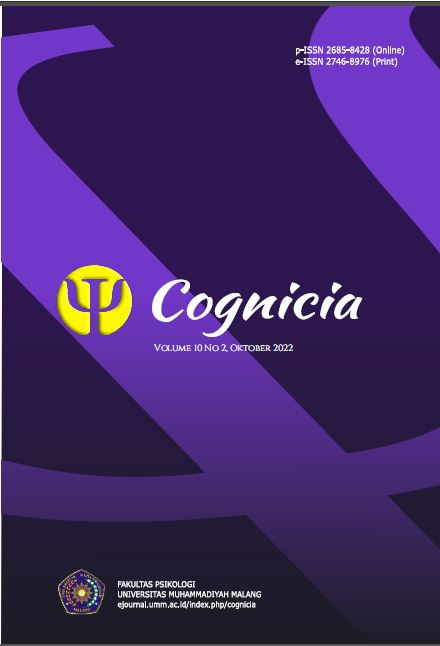Dinamika psikologis remaja yang mengalami broken home karena orang tua bercerai
DOI:
https://doi.org/10.22219/cognicia.v10i2.22072Abstract
Harmony in the family is something that every individual wants. However, there are some families who experience divorce due to conflict or dispute, so the term broken home was born. This study aims to examine the experiences and meanings of adolescents on the condition of a broken home experienced because their parents divorced. The research was conducted using a qualitative method with a phenomenological approach. The research respondents were taken through purposive sampling technique, totaling three people aged 15-21 years with divorced parents. Data obtained from interviews were then analyzed using Interpretative Phenomenological Analysis. The results of the analysis of this study indicate that the three respondents experienced changes in behavior in a negative direction, uncontrollable emotions, and psychological conditions with trauma. In addition, they said that their parents paid less attention and affection after the divorce. As for their positive meaning of parental divorce as a process of self-maturation, besides being interpreted negatively as a dark period and the lowest point in life.
Keywords: adolescents, broken home, family, psychological
Downloads
References
Badan Pusat Statistik. (2020). Data perceraian di Indonesia.
Bastaman, H. D. (2007). Logoterapi: Psikologi untuk menemukan makna hidup dan meraih hidup bermakna. PT Raja Grafindo.
Chaplin, J. P. (2011). Kamus lengkap psikologi. Rajawali Pers.
Creswell, J. W. (2007). Qualitative inquiry and research design: Choosing among five approaches. SAGE Publication.
Creswell, J.W. (2014). Research design: Qualitative, quantitative, and mixed methods approaches (4th ed.). SAGE Publication.
Dariyo, A. (2008). Psikologi perkembangan dewasa muda. Grasindo
Davison, G. C., Neale, J. M., & Kring, A. M. (2014). Psikologi abnormal. PT Raja Grafindo Persada.
Diananda, A. (2018). Psikologi remaja dan permasalahannya. Istighna, 1(1), 116-133.
https://doi.org/10.33853/istighna.v1i1.20
Erikson, E. H. (2009). Identitas dan siklus hidup manusia (A. Cremers, Trans.). Penerbit Gramedia. (Original work published 1989)
Frankl, E. V. (2004). Man’s search for meaning: Mencari makna hidup, hakikat kehidupan, makna cinta, makna penderitaan. Nuansa.
Hasanah, U. (2019). Pengaruh perceraian orang tua bagi psikologis anak. Jurnal Analisis Gender dan Agama, 2(1), 18-24. https://doi.org/10.31958/agenda.v2i1.1983
Hertina & Nelli, J. (2007). Sosiologi keluarga. Alif Riau.
Hurlock, E. B. (2004). Psikologi perkembangan: Suatu pendekatan sepanjang rentang kehidupan (edisi ke-5). Erlangga.
Ihromi, T. O. (2004). Bunga rampai sosiologi keluarga. Yayasan Obor Indonesia.
Ismiati. (2018). Perceraian orang tua dan problem psikologis anak. Jurnal At-Taujih, 1(1), 1-16. https://doi.org/10.22373/taujih.v1i1.7188
Kahija, L. (2017). Penelitian fenomenologi: Jalan memahami pengalaman hidup. PT Kanisius.
Lestari, S. (2012). Psikologi keluarga: Penanaman nilai dan penanganan konflik dalam keluarga. Kencana.
Massa, N., Rahman, M., & Napu, Y. (2020). Dampak keluarga broken home terhadap perilaku sosial anak. Jambura Journal of Community Empowerment, 1(1), 1-12. https://doi.org/10.37411/jjce.v1i1.92
Muttaqin, I., & Sulistyo, B. (2019). Analisis faktor penyebab dan dampak keluarga broken home. Jurnal Studi Gender dan Anak, 6(2), 245-256. https://doi.org/10.24260/raheema.v6i2.1492
Nasution, S. M., & Prastikasari, V. A. (2020). Hubungan antara kecenderungan alexithymia dengan hubungan dekat pada dewasa awal. Jurnal Communicate, 6(1), 7-12. https://doi.org/10.31479/jc.v6i1.199
Ningrum, P. R. (2013). Perceraian orang tua dan penyesuaian diri remaja. Psikoborneo: Jurnal Ilmiah Psikologi, 1(1). 39-44.
https://doi.org/10.30872/psikoborneo.v1i1.3278
Nurkhasyanah, A. (2020). Optimalisasi psikologi perkembangan anak dalam lingkungan keluarga. Japra: Jurnal Pendidikan Raudhatul Athfal, 3(2), 1-13. https://doi.org/10.15575/japra.v3i2.8809
Papalia, D. E., Olds, S. W., & Feldman, R. D. (2010). Human development: Perkembangan manusia (edisi ke-9). Kencana.
Paramitha, N., Nuraeni, N., & Setiawan, A. (2020). Sikap remaja yang mengalami broken home: Studi kualitatif. JMCRH, 3(3), 137-149. https://doi.org/10.36780/jmcrh.v3i3.136
Pratiwi, V. U., & Handayani, S. (2013). Pengaruh keluarga terhadap kenakalan anak. Jurnal Pendidikan, 22(1), 97-104.
Santrock, J. W. (2006). Life-span development. McGraw-Hill Education.
Santrock, J. W. (2007). Remaja (edisi ke-11, jilid 1). Erlangga.
Suhendi, H., & Wahyu, H. (2001). Pengantar studi sosiologi keluarga. Global.
Syarifuddin, A. (2006). Hukum perkawinan Islam di Indonesia. Prenada Media.
Taylor, G. J., & Bagby, R. M. (2013). Psychoanalysis and empirical research: The example of alexithymia. Journal of American Psychoanalysist Association, 61(1), 99-133. https://doi.org/10.1177/0003065112474066
Untari, I., Putri, K. P. D., & Hafiduddin, M. (2018). Dampak perceraian orang tua terhadap kesehatan psikologis remaja. Profesi (Profesional Islam): Media Publikasi Penelitian, 15(2), 99-106. https://doi.org/10.26576/profesi.272
Utari, R., & Rifai, A. (2020). Makna hidup menurut Victor E. Frankl dalam pandangan psikologi Islam. Jurnal Ilmiah Penelitian Psikologi, 7(2), 40-51.
Downloads
Published
How to Cite
Issue
Section
License
Copyright (c) 2022 Mutmainnah Budiman, Widyastuti Widyastuti

This work is licensed under a Creative Commons Attribution-ShareAlike 4.0 International License.
Authors who publish with Jurnal Cognicia agree to the following terms:
- For all articles published in Jurnal Cognicia, copyright is retained by the authors. Authors give permission to the publisher to announce the work with conditions. When the manuscript is accepted for publication, the authors agree to automatic transfer of the publishing right to the publisher.
- Authors retain copyright and grant the journal right of first publication with the work simultaneously licensed under a Creative Commons Attribution-ShareAlike 4.0 International License that allows others to share the work with an acknowledgment of the work's authorship and initial publication in this journal.
- Authors are able to enter into separate, additional contractual arrangements for the non-exclusive distribution of the journal's published version of the work (e.g., post it to an institutional repository or publish it in a book), with an acknowledgment of its initial publication in this journal.
- Authors are permitted and encouraged to post their work online (e.g., in institutional repositories or on their website) prior to and during the submission process, as it can lead to productive exchanges, as well as earlier and greater citation of published wor (See The Effect of Open Access).

This work is licensed under a Creative Commons Attribution-ShareAlike 4.0 International License







